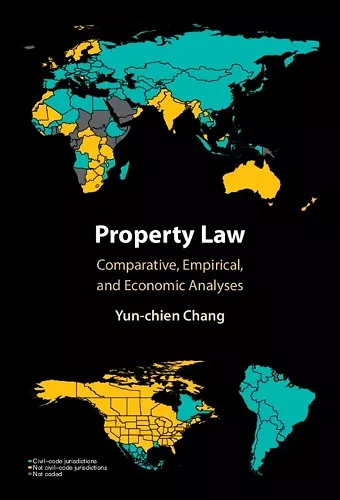Property Law
Comparative, Empirical, and Economic Analyses
Format:Hardback
Publisher:Cambridge University Press
Published:1st Jun '23
Currently unavailable, and unfortunately no date known when it will be back

Use hand-coded data on nearly 300 dimensions on the substance of property law in 156 jurisdictions in the world.
The book builds on hand-coded data on nearly 300 dimensions on the substance of property law in 156 jurisdictions globally and applies plain-language economic analysis to real-world legal schemes. Cutting-edge machine learning algorithms and statistical analysis are applied. Detailed citations to laws in each jurisdiction are useful to lawyers.The first book of its kind, Property Law: Comparative, Empirical, and Economic Analyses, uses a unique hand-coded data set on nearly 300 dimensions on the substance of property law in 156 jurisdictions to describe the convergence and divergence of key property doctrines around the world. This book quantitatively analyzes property institutions and uses machine learning methods to categorize jurisdictions into ten legal families, challenging the existing paradigms in economics and law. Using other cross-country data, the author empirically tests theories about property law and comparative law. Using economic efficiency as both a positive and a normative criterion, each chapter evaluates which jurisdictions have the most efficient property doctrines, concluding that the common law is not more efficient than the civil law. Unlike prior studies on empirical comparative law, this book provides detailed citations to laws in each jurisdiction. Data and documentation are publicly available on the author's website.
'With its unprecedented wealth of data on property laws in jurisdictions around the world, this book is a methodological tour de force. The innovative economic analysis draws on an often surprising comparative picture, and the comparative work is informed by a sophisticated theoretical vision. Chang has produced a landmark in both comparative law and the law and economics of property.' Henry Smith, Fessenden Professor of Law, Harvard Law School
'Yun-chien Chang's monumental empirical study of property institutions across the globe yields genuine insight into the nature and value of different property norms. A technically impressive piece of scholarship that identifies and codes property rules across 156 jurisdictions, it provides a compelling answer to an important question, the comparative efficiency of common law and civilian approaches to property law. Blending empirical, doctrinal, and normative approaches, Yun-chien Chang has moved our understanding of property institutions onto an entirely new and impressively solid foundation. I fully expect this truly extraordinary piece of work will become both a point of reference and a source of inspiration for the policymakers, lawmakers, and scholars around the world.' Larissa Katz, Professor and Canada Research Chair in Private Law Theory, University of Toronto
'Systems of property law differ, but as this book shows they differ not so much as one would think. This book offers a very impressive comparative overview of property law across the globe by coding legal systems. In doing so Chang offers deep insights into the general structure of property law and categories of approaches to problems.' Bram Akkermans, Professor of Property Law, Maastricht University
ISBN: 9781009236591
Dimensions: 235mm x 158mm x 29mm
Weight: 790g
400 pages